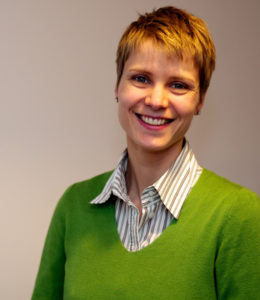We are delighted to introduce our latest Environmental Science: Processes & Impacts Emerging Investigator, Anke Neumann!
Anke Neumann is an environmental chemist (MSc in Chemistry from ETH Zurich, 2004) and received her PhD from ETH Zurich (2009). She carried out postdoctoral research in Bangladesh (freelance, 2009-2011) and at the University of Iowa (fellowships, 2011-2013). In 2014, Anke joined Newcastle University as a Lecturer in Environmental Engineering.
Her research focuses on redox processes at the mineral-water interface and how these processes affect the fate of organic and inorganic compounds in the environment. For more details, visit her research group’s website
Read her Emerging Investigators series article “As(V) in magnetite: incorporation and redistribution” and find out more about her research in the interview below:
Your recent Emerging Investigator Series paper focuses on sorbed and incorporated As on magnetite and the effect of Fe minerals on As mobility in natural systems. How has your research evolved from your first article to this most recent article?
My first article was based on my MSc work on the redox reactivity of Fe(II) species associated with Fe-bearing clay minerals and I have worked on redox reactions of Fe minerals and their effect on contaminant fate ever since. I started working on the interactions between Fe minerals and As after my PhD, when I led and conducted a long-term field project investigating As removal from drinking water with zero-valent iron-based filters in Bangladesh. It was then lucky coincidence that I arrived in Michelle Scherer’s lab as a postdoc just as Brittany Huhmann was beginning her MSc project on As-magnetite interactions, which provided the data for this most recent article.
What aspect of your work are you most excited about at the moment?
I am actually excited about two projects. On the one hand, my PhD students have been producing very interesting results from their work on contaminant degradation with Fe-bearing clay minerals that they reduced with dissolved Fe(II). On the other hand, I am also interested in oxygenation reactions of Fe(II)-bearing clay minerals, which have long been overlooked and are now – finally – enjoying increasing attention. So, this new field is expanding and quickly gaining momentum, and I am excited to contribute to further developing this field.
In your opinion, what is the potential impact of your findings on groundwater quality?
I do not think that our findings will change groundwater quality per se but rather increase our understanding of how and where As is sequestered in the environment, for example an aquifer. The new insights will also help us to design and engineer sequestration pathways, be it in situ in the aquifer or once the water has been pumped to the surface. This will be particularly important when we think about water management for the future, which will likely include approaches such as managed aquifer recharge or aquifer storage and recovery and produce conditions under which As sequestration into magnetite could occur.
What do you find most challenging about your research?
Most of my research focuses on understanding reactions mechanisms and how things work at a very fundamental level. I find it sometimes difficult to convince others of the significance and relevance of my research to environmental issues and ‘real-world’ problems.
In which upcoming conferences or events may our readers meet you?
I usually attend one or two conferences a year, such as Goldschmidt, ACS National Meetings, or the Clay Minerals Society Annual Meeting. My ‘conference season’ has just ended with the start of the new semester and so far, the only set event this year is the biennially held Iron Biogeochemistry workshop.
How do you spend your spare time?
I spend most of my free time with my family. Seeing my daughter (4) grow up, exploring the world, and, just recently, starting school is my reality check and spending time with her makes me realize the (other) really important things in life.
Which profession would you choose if you were not a scientist?
This is one of the most difficult questions for me – I never really considered any other profession. I think that if I had to quit being a scientist, I would need to do something really different but I also enjoy creating ‘TOC art’ and similar, although I am not sure that I am sufficiently artistic to make this a profession.
Can you share one piece of career-related advice or wisdom with other early career scientists?
As a scientist, your work is constantly being judged: prepare yourself for harsh criticism and also failure to convince, for example reviewers of your papers or grant applications. When I am faced with rejection, I find it important to be able to tap into a broad variety of support: from my colleagues who have been in the same situation and cheer me on; from my friends who engage me in a life outside of academia; and, most importantly, from my family who so naturally confront me with a totally different perspective on things.











